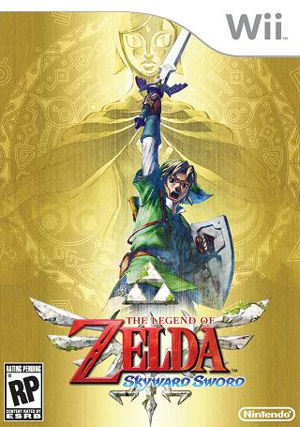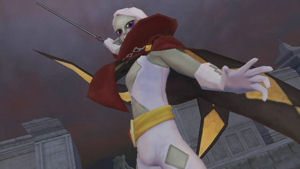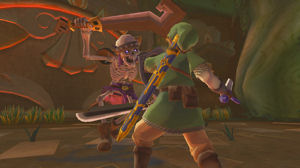Solo Gamer Review: The Legend of Zelda: Skyward Sword
 |
THE LEGEND OF ZELDA:
SKYWARD SWORD
Release Date: 11/20/2011
Platform: Nintendo Wii
Developer: Nintendo
Publisher: Nintendo
Sites: Official | IGN
|
 |
THE LEGEND OF ZELDA:
SKYWARD SWORD
Release Date: 11/20/2011
Platform: Nintendo Wii
Developer: Nintendo
Publisher: Nintendo
Sites: Official | IGN
|
Nintendo is closing out the Wii library the same way it started building it, with a Zelda title. Released at the same time as the series' 25th anniversary, Skyward Sword has much to live up to. Is this latest Zelda adventure worthy of its golden legacy, or does it prove that Nintendo has lost its way in this age of HD graphics, gigantic open worlds, and multiplayer FPS games?
STORY
 | | The Demon Lord is tired of your meddling |
A direct prequel to Ocarina of Time, Skyward Sword is touted as the earliest title in the Zelda timeline(s). Link, this time around, is a young student at a school for knights in the airborn world of Skyloft, along with Zelda, who is a classmate that obviously fancies him. Shortly after Link wins a flying contest, Zelda is swept away by an inexplicable storm and falls to the world below, a land whose existence most people doubt. Link then discovers that he is a chosen hero who must travel below the clouds, fight an unspeakable evil, and rescue her.
Though following a familiar pattern, the plot unfolds in a new way, with Link constantly a step behind and never really certain what's going on. Rescuing Zelda is the carrot that motivates him forward, but make no mistakes, the plot is far more complicated than it appears and contains a surprising number of references to other games in the series, most notably--but not exclusively--Ocarina of Time. Without spoiling too much, the story makes a strong effort to explain the entire series, lay out the origin of the master sword, and set the stage for the rise of Ganondorf (who, as promised, does not appear anywhere in Skyward Sword). Fans who enjoy reading too much into the plots of Zelda games will be delighted.
Still, Skyward Sword is more than just a prequel to previous games; it does contain its own unique tale. The biggest surprise is that, despite it being the first story in the series chronology, it is still reliant on a heavy backstory and mythology. It even has elements of time travel. Though the twists are largely predictable, it is difficult to discern where the story is going until you start approaching the end. There are also plenty of unique, often oddball characters, and the primary antagonist, the self-proclaimed Demon Lord Ghirahim, is unlike any previous villain in the series.
In brief, the story is far deeper and more cinematic than Zelda fans have any right to expect. It is unique and surprising--sometimes even mind-blowing--without deviating too far from the Zelda formula. Clocking in at easily more than 40 hours, it's also the longest Zelda game, though it is technically smaller in size than Twilight Princess. It is a significant leap forward for the series, at least as dramatic as the leaps taken by A Link to the Past and Ocarina of Time.
|
[STORY: 10 - It may not seem like it at first glance, but this story is arguably the best one in the entire series thus far]
|
|
GAMEPLAY
 | | It's like they don't want you to hit them |
Skyward Sword is Nintendo's closing argument for the Wii, and it's a good one. Utilizing the sorely underused Wii Motion Plus, this game features a one-to-one interface between controller and gameplay that is far more responsive and satisfying than the sloopy waggle controls of Twilight Princess. Indeed, there is no question that the experience was built from the ground up with Motion Plus in mind, as every fight, puzzle, and method of exploration is reliant on a mastery of this interface. The need to constantly recalibrate your Wiimote is tiresome, but I consider that a weakness of the hardware, not a weakness of the game itself.
Where fighting is concerned, the game forces you to hone a fair amount of skill in combat, because enemies respond extremely quickly and with surprisingly sophisticated AI, able to read where you are pointing your sword and predict where your swings will come from. This, by itself, represents a departure from the series' overall direction when it comes to difficulty and challenge; depending on your abilities, Skyward Sword may be the toughest Zelda game since the controller-hurling insanity of The Adventure of Link. Still, you can play this game from the comfort of your couch without looking like a drunken orangutan flinging his poo. It won't even wear out your wrists except in the case of one or two truly epic boss battles. With games like this, Nintendo seems to have finally gotten the memo that hardcore gamers aren't interested in physical exercize.
More than just the interface has been tweaked and improved. For one thing, one of my biggest complaints from Twilight Princess, namely the complete uselessness of money, has been fixed. Skyward Sword has more RPG elements than any previous Zelda title, allowing you to upgrade your weapons and tools, encouraging you to purchase more inventory space, allowing you to get wallets so big it is virtually impossible to fill them, making potions more varied and useful than ever before, and having bugs and ingredients you need to collect in order to purchase upgrades. One of the crutches of previous games, the fairy in a bottle, has been marginalized by having the eight hearts it replaces be pathetic compared to the two servings of full health replenishment you can get from a fully upgraded red potion. On top of that, you can purchase potions that help you breathe underwater, become temporarily invincible, and repair your shield. Oh, didn't I mention that your shield takes damage and can even break? On the plus side, there are no like-likes to take your shield from you this time around.
Speaking of like-likes, some of the series' more infuriating staples have been pruned away. There are no stupid circles of stones hiding obvious secrets, no enemies that force you back to the start of a dungeon, no puzzles involving the timed lighting of torches, and your ethereal companion, Fi, isn't nearly as annoying as Navi or Midna. Still, Fi isn't perfect; she tends to state the obvious in the most tedious way possible and she bugs you when your hearts get low--something that tends to happen during the game's more intense moments--adding her own annoying chime to the ear-stabbing beeping of your low heart meter.
-e. magill 12/13/2011
|
|